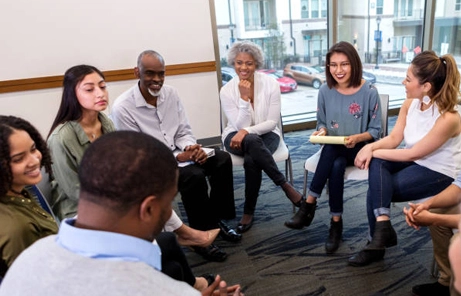If you or someone you love is struggling with drug addiction or alcohol addiction, it may seem like everything is hopeless and finding it difficult to know where to begin. Fortunately addiction is a treatable disease and by using proven and professional treatment methods, long-term recovery can be embraced.
On this page we will explain how an integrated treatment program can encourage you or a loved one to start and sustain a life without drugs or alcohol.
What is Addiction Rehab (Rehabilitation)?
Addiction ‘rehabilitation’ is a holistic term that encompasses both therapy and medical interventions to treat both legal and illegal substance dependencies.
Rehab programs are successful when they are personalized to your individual needs, and may encompass inpatient programs, outpatient programs, medically-supervised detoxes and aftercare support programs.

Facts & Statistics about Addiction in Santa Cruz
Prevalence of Substance Use Disorder, by Drug Type
(IN THOUSANDS)
- 2,7578.5%Any Substance
- 2,0886.4%Alcohol
- 1,0683.3%Ilicit Drugs
- 2060.6%Pain Medication
Drug- and Alcohol-Induced Deaths by Age Group, California, 2016
- Alcohol-Induced
- Drug-Induced
- 18 to 250.5
- 9.6
- 26 to 354.3
- 13.9
- 36 to 6424.2
- 22.9
- 65+23.7
- 9.4
Drug Use, by Selected Type and Age Group California, 2015 to 2016
- 12 to 17
- 18 to 25
- 26+
- Marijuana*13.2%
- 34.0%
- 13.5%
- Misuse of Pain Medications3.5%
- 8.0%
- 4.3%
- Cocaine0.8%
- 7.2%
- 1.8%
- Heroin0%
- 0.4%
- 0.2%
What are the treatment options available in Santa Cruz?
A consolidated treatment approach is the most successful way to tackle the root causes of drug or alcohol addictions. Although symptoms of addiction need to be addressed, life skills must also be learnt in order to focus on the causes of your dependency.

Private Residential Programs
Residential addiction rehab programs require you to stay at the rehab facility and take part in your treatments on-site. One of the major pros is access to continuous treatment and addiction specialists. When you leave your home and move into a treatment center, you can free yourself from vulnerabilities to triggers that may have influenced your decision to abuse substances or alcohol.
By having an environment around you that is supportive, the possibility of relapse is reduced and you are far more likely to finish your rehab program. A residential program delivers the best solution when you have a dual diagnosis, an intense substance dependency or co-occurring conditions. We know that the first year of recovery are difficult and after a residential rehab program, you will need to stay focused to maintain sobriety. Once you have completed your residential program, you must consider what you’d like from your new life, as you transition to becoming more independent.
Do You Need Help?
Our addiction advisers are here to help you.

Sober Living Programs
Sober living programs are structured with the required guidance to help people in recovery get what they need from life. They help you through:
- Sending a house manager to check in on you regularly
- Prescribing the kinds of behaviors that are acceptable in recovery
- Building on supportive and meaningful connections with other peers in recovery
Outpatient Programs
By taking part in an outpatient program you have greater flexibility, because you can visit the rehabilitation center for treatment weekly and continue family or work commitments.
Outpatient programs offer addiction recovery through:
- Education on substance abuse
- Therapy and psychological interventions like group and individual therapy – An outpatient program may last anywhere from a few months to a year, this will depend on your requirements.
Detox Only Programs
A detox program is the first step in rehab and is required to address your physical dependency on a substance by removing all traces of it from your system. Withdrawing from drugs or alcohol is the body’s normal response to detoxification, as it begins getting used to working without the substance.
This initiates the rehab journey, which is ongoing as you come to terms with the root reasons for your dependency in order to avoid repeating the cycle in the future. Many substances result in ongoing cravings and withdrawal symptoms after you have completed detox. Building on important skills can limit your chances of relapse as you focus on your new life.
Paying for Private Treatment
The private treatment costs may be covered through your health insurance or funded with your own money. The majority of health insurance providers offer some cover for rehab, which includes drug or alcohol detox, the rehab treatment program, medicines you may need and aftercare programs. The extent of cover provided will depend on the details of your policy as well as your provider’s terms of agreement.
We suggest you understand how much cover you are entitled to prior to enrolling in a program. To find out what you could claim through your insurance provider, go to our Verify Your Insurance page.
Clients will have to pay for the cost of treatment if they do not claim from their insurance policy. Many treatment facilities include payment plans to clients so that they can pay for treatment in instalments.
State Funded Programs
State-funded treatment programs are aimed at individuals who want to address a substance or alcohol use disorder but have limited resources to enroll in a treatment program.
These programs make use of funding from Medicaid and federal/state budgets to facilitate recovery through:
- Medical assessment and detox if required
- Addiction counseling and extended care
If you are not covered by private health insurance or you live in a low income household, you should apply for a state-funded treatment program. You will need to provide:
- Proof of where you live
- Proof of income
- Your medical history and details about your addiction
- Proof that you can legally live in the US
You can learn more about the application process here: https://www.grants.gov/
In order to locate contact details for your state agency, this pdf provides the needed information

The following state-funded addiction rehab programs are available in Santa Cruz:
Encompass Community Services Santa Cruz Residential Recovery
125 Rigg Street, Santa Cruz, CA 95060
831-226-3728
www.encompasscs.orgJanus Community Clinic
1000 Emeline Avenue, Suite A, Santa Cruz, CA 95060
831-425-0112
www.janussc.orgNew Life Community Services Inc
707 Fair Avenue, Santa Cruz, CA 95060
831-427-1007
www.newlifesc.org
Maintaining Addiction Recovery in Santa Cruz
Maintaining addiction recovery can feel difficult once you return to life outside of rehab. At the rehab center the environment was safe and you had professional support. When you leave, you may encounter new challenges or triggers that test your coping skills in ways you may not have anticipated. In our experience, clients with intense dependencies and those who do not develop the necessary support structure find long term recovery more difficult when they leave rehab. Relapse can occur when you don’t have aftercare to support you in your new-found sobriety.
The following AA/NA meetings are available in Santa Cruz:
AA Sober Slugs
Wheelchair Access: Charles E Merrill Lounge, Santa Cruz, CA, 95060
Tuesday: 8:00 pm – 9:00 pm
https://alcoholicsanonymous.com/AA - Brown Baggers Group Transwomen Welcome
Women and Wheelchair Access: 850 High Street, Santa Cruz, CA, 95060
Tuesday: 1:00 pm – 2:00 pm
https://alcoholicsanonymous.com/Breakfast Meeting
Open, Speaker/Discussion, Wheelchair and Children Welcome:
846 Front St., Santa Cruz, CA, 95060
Sunday: 9:00 am – 11:00 am
https://www.santacruzna.org/meetings/
Aftercare & Alumni Programs
By participating in an aftercare program you get extended rehab support when you go home. Unfortunately, relapse rates can peak as high as 60%, and because life can be unpredictable, extended support is an important lifeline to support your recovery long-term.
As you get near to completing your treatment program, we will collaborate with you to create an aftercare package that includes services most vital to your long-term recovery. Alumni programs are a useful bonus to completing rehab and gives you community support with former clients and staff.
You will be invited to attend team events, take part in a number of initiatives, build connections, and receive support from other ex-clients who are also in recovery. Plus, you may want to take the opportunity to be supportive of others if you decide to.
Support Groups (Fellowship Meetings)
Support groups are a vital resource because they incorporate social structures into addiction recovery. To maintain addiction recovery, will receive long-term recovery support if you join groups like Narcotics Anonymous or Alcoholics Anonymous by attending their 12-step meetings.
When you go to support group meetings, you will be able to share your experiences and feel empowered by other individuals who are also in recovery. Many individuals in recovery attend nearby meetings to support them in their recovery journey. Support groups provide them with vital tools to maintain sobriety, and allow them to take responsibility for their recovery.

Support for Families & Children Affected by Addiction

Addiction causes pain for everyone living in the family unit to different degrees. Support is essential for all members of a family, not only the person struggling with the addiction.
Support groups for families has two major benefits: you can help yourself and the person with the addiction.
Some helpful support groups for families and children affected by addiction include:
- Parents of Addicted Loved Ones
- SMART Recovery Family & Friends
- NAMI Family Support Groups
- Al-Anon
- Families Anonymous
- Alateen
- Nar-Anon









